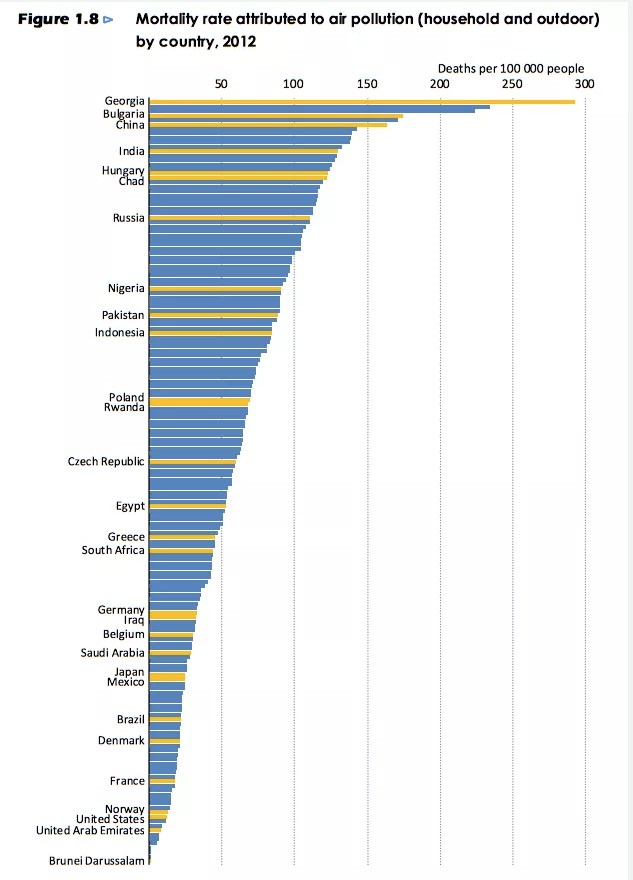საქართველო, ლიდერობს ქვეყნების სიას, ყველაზე დაბინძურებული ჰაერის მიხედვით
რაც 1 სულზე სიკვდილიანობის მაჩვენებელს ზრდის
სტატიაში, ნათქვამია, რომ შესაძლოა ეს გამოიწვია ძველი და დიზელზე მომუშავე ავტომობილების უკონტროლო შემოტანამ, რადგან სახელმწიფომ გააუქმა კონტროლის ყველა მექანიზმი
მაზოხისტების ქვეყანა
 http://www.vox.com/2016/6/27/12040712/air-...ution-countries
http://www.vox.com/2016/6/27/12040712/air-...ution-countriesA couple things stand out here:
1) These are mortality rates, not absolute figures. Georgia and Bulgaria top the list, but countries like China and India have more total deaths from air pollution since they have so many more people.
2) These blunt rankings can obscure a lot of variation within countries. In China, for instance, heavier coal pollution north of the Huai River shaves about 5.5 years off life expectancy compared with the south, according to one study.
3) The United States certainly has room for improvement, but it has some of the cleanest air around. One reason the country has lower mortality from pollution than, say, France or Germany is that we have fewer diesel cars on the road. Diesel engines can be more fuel efficient than gasoline engines, but they also emit more soot, particulates, and NOx. Europe has been struggling to clean up these pollutants, particularly since lax testing procedures have allowed many cars to emit more than the legal limits.
4) How did the Republic of Georgia get to be No. 1 anyway? The IEA doesn't offer any details. But via Twitter, air-quality expert Tim Kovach pointed me to Georgia’s recent State of the Environment report for some clues. The country has seen a sharp rise in the number of old, dirty diesel vehicles on the road over the last decade — and pollution testing is virtually non-existent:
In Georgia the public transport system is not sufficiently developed and as a consequence a significant proportion of the population uses private vehicles as the preferred mode of transport. As a result, the number of private vehicles has grown rapidly over the past decade and has almost doubled in the last five year period.
Most of the cars purchased are secondhand cars imported from aboard and the average age of the fleet in Georgia is 10-15 years. Diesel engine cars are very popular.
Roadworthiness testing of vehicles is not in operation at the moment in Georgia and as a result many cars on the roads are in bad mechanical condition. Periodic testing of exhaust gases has also been suspended. Some low quality fuels available on the market can cause damage quickly to the catalytic converters of vehicle exhausts. Car owners tend to have the damaged catalytic converters removed and not replaced, resulting in higher emissions from the vehicle. Traffic management is still problematic in the cities of Georgia and traffic jams happen quite often. All of these factors lead to high emissions from motor transport in Georgia.
Kovach also points out a legacy of Soviet industry: Old manganese mines, for instance, still have very high levels of air pollution.
5) None of this is inevitable! As countries get richer, they tend to invest more in clean-up technologies that improve air quality — something China is currently focusing on. Indeed, much of the IEA report is devoted to outlining policies and programs that will reduce overall air pollution deaths by 3.3 million by 2040.
That includes installing emissions-control technologies on cars and power plants in the developing world, as well as giving people access to clean fuels for the cooking and heating stoves (a major source of deadly indoor pollution). I’ll just say a bit about that last one.
This post has been edited by anthropod on 28 Jun 2016, 13:02
მიმაგრებული სურათი (გადიდებისთვის დაუწკაპუნეთ სურათზე)



